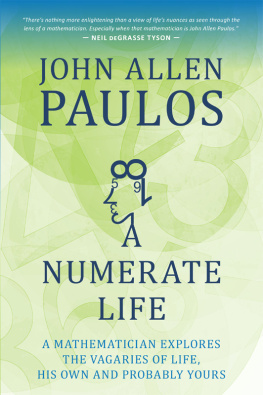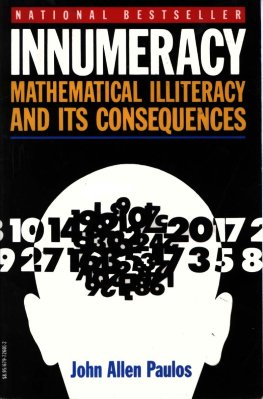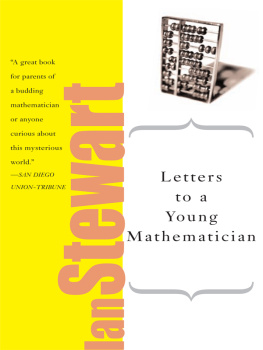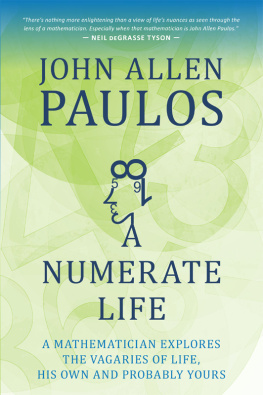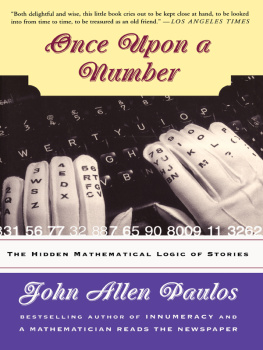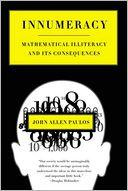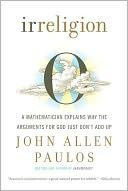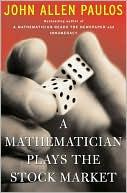
SOME EARLY ESTIMATES, SPECULATIONS
Postponing discussion of more engaging biographical issues and more intriguing mathematics, I'll begin simply with my early enchantment with numbers, the atoms of the mathematical world. Long before the Count on Sesame Street, I loved to count. I counted anything and everything, including, my father told me, the number of little thin cylinders in a pack of his ubiquitous cigarettes, although I doubt he appreciated the cigarettes being all grubbed up with my sticky toddler fingers. I mentioned in the introduction my numerical issues with Santa Claus. A considerate little fellow, I also remember humoring my parents whenever they mentioned him. I wanted to protect them from my guilty knowledge of his nonexistence, and so I feigned belief. (This is a nice illustration of the difference between the mutual knowledge my parents and I hadof his nonexistence in this caseand the common knowledge we didn't have, not only knowing this fact but also knowing that the others knew, knowing that the others knew that we each knew, and so on.) My brother Paul, three and a half years my junior, was only a baby, so it wasn't him I was trying not to disillusion.
In any case, my qualitative calculations had proved to me that there were too many expectant kids around the world for Santa Claus to even come close to making his Christmas Eve rounds in time, even if he didn't stop for hot chocolate or bathroom visits, a but I do remember making rough order-of-magnitude estimates that showed Santa to be way overextended.
An oddly vivid memory of a similar idea dates from my days as a fifth grader. (It's a tiny bit jarring to even record that I had days as a fifth grader.) The teacher was discussing some war, and a girl in the front row asked how the losing country survived if all its people died in the war. She cried when she spoke, and it was clear she believed that every single soldier as well as almost all other people in a losing country died. I remember wondering if, common sense aside, she'd ever seen the aftermath to World War II depicted in any of the countless cheesy war movies I used to watch every Saturday afternoon. I was very shy in elementary school and only quietly came to my smug judgment about her numerical navet. Besides I really liked her and, in a ten-year-old sort of way, thought her emotionality cute. (I plead guilty to having been a ten-year-old sexist.)
Before resuming the narrative, let me flash-forward for the next few paragraphs to note that these particular memories are not mere personal remembrances, but rather they connect up with later concerns of mine about numerical estimation and innumeracy. The sad not so cute reality is that most adults don't have a much keener appreciation for magnitudes than my fifth-grade classmate. To cite a once popular American TV show, I think it's fair to conclude that they are in this sense not smarter than a fifth grader, especially when the issue is numerical estimation.
Some easy examples from a course in quantitative literacy that I often teach illustrate the point as well as they do the persistence of my fifth-grade judgmental attitude. For example, if I say to students in my class or to adult acquaintances that I heard that a Rose Bowl quarterback once shook hands with almost everyone in the stands after a startling come-from-behind victory, they are rightfully dubious that this would ever happen. Still, very few will note that, like Santa's journey, it is next to numerically impossible. Even if only half of the 100,000 fans or so at a game came down to shake hands and each handshake took, say, 4 seconds, that's 15 per minute, and 50,000 divided by 15 per minute is more than 3,300 minutes or about 7 8-hour days of handshaking. That would likely mean that the quarterback would never throw another pass.
Continuing with this perhaps jejune line of thought, I often get similar off-the-mark responses from students as well as educated neighbors if I claim to have read a headline claiming that experts fear housing costs (the total of rents and mortgages) will top $3 billion next year in the United States. They might respond by referring to the mortgage crisis, to greedy bankers, and the like, but they seldom will point out that the number is absurdly smallequaling about $10 annually per person for housing. And near total bafflement is the response to playful questions like How fast does a human grow in miles per hour? Alas, 62.38172548 percent of the time students and others take numbers as merely providing decoration, but not really imparting information.
Incidentally, a one-question diagnostic test for innumeracy is to ask someone to give very quickly and without resorting to a calculator the approximate average of these three numbers: 11 billion, 6 trillion, and 117 million. Only the numerate will answer 2 trillion. And a classic educational gambit assumes that the 4.5-billion-year history of the earth has been shrunk down to one year and asks you to determine how long before the end of the year various events occurred, say, the appearance of the most ancient religions as well as the appearance of you. Taking the first appearance of ancient religions to be very roughly 4,500 years ago and the first appearance of little old you, let's say, 45 years ago, the answers are only 30 seconds and .3 seconds, respectively, before midnight on December 31.
These little calculations are easily dismissible, butand this is the pointI think they're examples of the same numerical obtuseness that afflicts many who think that a disproportionate share of American wealth goes to foreign aid, or that government earmarks for relatively paltry 50-million-dollar projects are the cause of the deficit, or that terrorism or Ebola, but not global warming, is a serious risk. And very few are aware that the two-trillion-dollar cost of the Iraq War is about 250 times the annual budgets of the National Science Foundation and the Environmental Protection Agency. Not unrelated is the mundane risk blindness of bicyclists I see driving down narrow, busy streets near my home in Center City, Philadelphia. Many don't wear a helmet, ride with no hands on the handlebars, text away on a cell phone, and listen to music through their earbuds. At the same time they might be very concerned about pesticide residue on the apple they are eating. Quite a stretch, I know, from beliefs about Santa Claus and bicyclists to foreign aid, war, and global warming, but this book contains at least as many general musings as personal remembrances, most of them, I hope, at least somewhat related.
To continue my story, at around this same time, the fifth grade or so, I began reading newspapers, an engaging introduction to which was provided by the Milwaukee Journal's Green Sheet. This four-page daily section was printed on green newsprint and was full of features that fascinated me. At the top was a saying by Phil Osopher that always contained some wonderfully puerile pun, a verbal category to which I'm still partial. There was also the Ask Andy column: science questions and tantalizingly brief answers. Phil and Andy became friends of mine. Were there a Twitter at the time and they had accounts, I would have been an avid follower and retweeter. And then there was an advice column by a woman with the unlikely name of Ione Quinby Griggs, who gave no-nonsense Midwestern counsel with which I often silently disagreed. Of course, I also read the sports pages and occasionally even checked the first section to see what was happening in the larger world.
Stimulated perhaps by Phil and Andy, I was captured at this young age by the idea of a kind of atomic materialism. I'd read that everything was composed of atoms, and I knew that atoms couldn't think, and so I thought this proved that humans couldn't think either. I was so pleased with this groundbreaking Epicurean idea (despite Phil, I didn't know the word yet) that I wrote it neatly on a piece of paper, folded it carefully, put it inside a small metal box, taped it securely, and buried it near the swing in our backyard where future generations of unthinking humans could appreciate my deep thoughts on this matter. I also remember speculating that just maybe there was a kid somewherein Russia, perhapswho was as smart as I was. Pursuant to this I would scrawl John is great in secret places from closets to the attic, demonstrating either delusions of grandeur or simply youthful arrogance.
Next page
